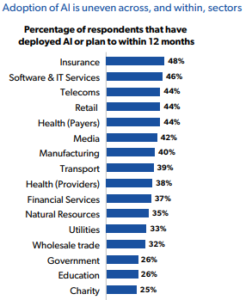By Ogunleye Oluwatobiloba Timothy
Artificial Intelligence (AI) represents a groundbreaking advancement in technology that has captivated global attention due to its remarkable potential. AI encompasses various domains, including machine learning (ML) and deep learning.
While AI refers to the ability of machines to make intelligent, human-like decisions and improve over time, ML specifically involves creating models often statistical that generate predictive outcomes and can evolve further.
Many people unfamiliar with the field often associate AI with humanoid robots that replicate human behaviour and intelligence, largely influenced by portrayals in the film industry.
While robots are indeed a part of AI, its applications extend far beyond that, including face recognition, fingerprint scanning, chatbots, pattern recognition, predictive business models, and sentiment analysis.
Previously, integrating AI into software development was a luxury only large organizations could afford, as it required highly skilled professionals and significant resources. However, advancements in AI frameworks with high levels of abstraction have made it much more accessible.
Today, even with minimal coding in a preferred programming language, developers can build intelligent systems with relative ease.
AI is transforming the business world by enabling predictive models for applications like real estate pricing, stock market predictions, financial modelling, and sentiment analysis. These models improve over time, providing accurate forecasts and enhancing decision-making.
AI-driven systems, such as Amazon’s recommendation engine, significantly boost sales, with over 60% of Amazon’s sales attributed to these technologies. Additionally, AI-powered chatbots have successfully replaced human support in many businesses, offering automated, real-time customer service and reducing operational costs.
While AI integration enhances efficiency and customer engagement, it also introduces challenges, such as workforce displacement, highlighting the need for businesses to balance automation with workforce development.
Many industries are increasingly adopting AI to handle tasks traditionally performed by humans. In the financial services sector, AI is utilized to analyse large volumes of data, detect fraud by identifying irregular activities, engage with customers through online communication, and carry out various critical operations. Technologies such as facial recognition, voice recognition, and machine learning (ML) offer significant advantages. These advancements help organizations improve customer value propositions while enhancing efficiency and effectiveness in their operations.
Types of Artificial Intelligence
- Reactive: Has no memory only responds to different stimuli
- Limited Memory: Uses memory to learn and improve its response
- Theory of Mind: Understand needs of other intelligent entities
- Self-Aware: Has human like intelligence and self-awareness
Source: https://www.forbes.com/sites/cognitiveworld/2019/06/19/7-types-of-artificial-intelligence/
Financial reporting companies are leveraging AI to streamline complex tasks like audits and property assessments. For example, Deloitte uses AI tools to analyse thousands of agreements and extract critical definitions, assess risks, and evaluate data. AI also enables predictive analytics, widely used in sectors like insurance, banking, and finance, to forecast trends and improve decision-making accuracy.
AI enhances efficiency by reducing time and energy spent on repetitive, resource-intensive tasks while minimizing human error. It supports managers by providing data for informed decision-making, though humans currently make the final decisions. However, as AI advances, systems are expected to handle increasingly complex tasks, potentially automating decision-making in the future.
Major Usage of AI in Fintech
- Decision making
- Predictive Analysis
- Fraud Detection
- Virtual financial Assistance
- Insurance Management
Source: https://www.fiapinternacional.org/wp-content/uploads/2018/07/Panel2_2.Ron_Moritz_VF.pdf
China has been making significant strides in AI development, with key regions like Beijing, Shanghai, Guangdong, Zhejiang, and Jiangsu playing pivotal roles. In 2017, the country unveiled its “Next Generation AI Development Plan,” a three-phase roadmap to establish global AI leadership. The plan aims to enhance China’s AI competitiveness by 2020, achieve major breakthroughs by 2025, and lead in global AI governance by 2030
Source: https://www.stateofai2019.com/chapter-4-the-race-for-adoption/
As AI becomes more widely adopted, it will transform organizational structures and business capabilities. However, implementing AI presents challenges, including the need for clear strategies with measurable benefits, securing skilled talent, addressing obstacles in end-to-end deployment, and fostering leadership commitment and accountability for AI initiatives.
 AI adoption is rapidly advancing in sectors like finance, technology, telecommunications, retail, healthcare, and media, reflecting both opportunities and strong commitment in these industries. These sectors benefit significantly from AI’s value-creation potential and are more inclined to embrace AI integration
AI adoption is rapidly advancing in sectors like finance, technology, telecommunications, retail, healthcare, and media, reflecting both opportunities and strong commitment in these industries. These sectors benefit significantly from AI’s value-creation potential and are more inclined to embrace AI integration
In contrast, government offices, educational institutions, and charitable organizations lag in AI adoption. Interestingly, insurance companies are 10% more likely than other financial services firms to adopt AI within the next year. In healthcare, payers demonstrate greater engagement with AI compared to suppliers. AI-based fraud detection, which outperforms traditional rule-based systems, has become the third most popular AI application, driving adoption among insurers and healthcare payers.
Source: https://www.stateofai2019.com/chapter-4-the-race-for-adoption/
In conclusion, AI applications can be utilized by any business to aid in financial and accounting decisions. As the benefits of AI continue to evolve, this technology will remain a significant part of our future. To stay competitive, businesses and society must adapt to new advancements by embracing the latest technologies and implementing necessary changes. Companies will need to integrate AI into their operations, while employees may need to upgrade their skills to secure their roles in an AI-driven workplace.





